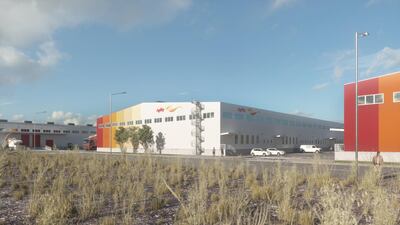Kuwait's Agility posted a 61.3 per cent drop in first half profit as the Covid-19 pandemic hit its aviation, airport and infrastructure operations, though its logistics unit benefitted from higher demand for warehouse storage.
Net profit declined to 16.2 million Kuwaiti dinars (Dh194.6m) in the first six months of 2020, down from 41.9m dinars in the same period last year, Agility said in a statement on Saturday. First half net revenue fell 3.7 per cent to 243.6m dinars.
"We entered 2020 with our business on sound footing, which is one reason that we were able to react quickly to the sweeping impact of the Covid-19 pandemic," Tarek Sultan, Agility's vice chairman and chief executive, said. "We also took steps to bring operating expenses and other costs in line with the new environment."
The Covid-19 pandemic has upended the world economy, disrupted global supply chains, hampered trade and dealt a blow to key sectors from aviation to shipping.
Kuwait-listed Agility said the pandemic had an "uneven" effect on its various businesses.
Its infrastructure group net revenue fell 8.4 per cent and gross revenue declined 10.2 per cent. Earnings before interest, taxes, depreciation, and amortisation dropped 18 per cent to 56m dinars in the first half, driven by its aviation and customs units.
National Aviation Services (NAS) reported a revenue decline of 29 per cent as airlines and airports where it operates cancelled or suspended flights and related services.
United Projects for Aviation Services Company (UPAC)'s revenue fell 51.8 per cent due to suspended operations at Kuwait International Airport.
At GCS, Agility’s customs modernisation company, revenue fell 21 per cent as the Kuwaiti government took measures to curb the spread of the virus.
"Aviation and airport operations have been directly impacted by the decline in air travel and traffic and are now pivoting towards the development of pioneering new technologies that will be essential to the re-enablement of global travel," Mr Sultan said.
However, the company's logistics parks arm saw some growth during the period.
Agility Logistics Parks (ALP)'s revenue grew 4.5 per cent due to increased demand for warehousing space, mainly from suppliers of medical equipment and food. ALP accelerated delivery of a few projects to meet customer demand. Developments in Kuwait, Saudi Arabia and Africa are proceeding as planned, despite some interruptions due to restrictions, it said.
“Our contract logistics business and logistics parks have weathered this reasonably well because demand for storage space has been steady or increased, especially as customers have looked to add to safety stock or support pandemic-driven increases in e-commerce sales," Mr Sultan said.
Agility's core logistics business Global Integrated Logistics (GIL) posted net revenue of 135.8m dinars, in line with last year’s performance. Net revenue increased in contract logistics, project logistics and air freight, but fell in ocean freight and fairs and events.
Its air freight volumes dropped 23.6 per cent and ocean freight fell 14.8 per cent in the first half of the year as demand weakened due to coronavirus-triggered border closures, production stoppages, and economic contraction, it said.
However, air freight yields increased because of capacity shortages and a spike in demand for urgent shipments of personal protective equipment and other medical gear. First-half air freight net revenue increased 17 per cent year-on-year. Ocean freight net revenue decreased 16 per cent year-on-year.
Agility has 2.2 billion dinars in assets while its net debt stood at 143.1m dinars as of June 30, 2020. Reported operating cash flow rose 128.2 per cent to 93.6m dinars in the first half.
The company did not provide a break down for its second quarter financial performance.
"The full impact of Covid-19 is not yet clear – there are many possible scenarios and many unknowns – but we are taking steps to weather the storm and emerge stronger," Mr Sultan said. "We are adjusting to the reality on the ground within each respective business, and bringing the cost structure in line with the new levels of business we are seeing."
The company has a strong focus on cash, "with a view to having ample liquidity to cover us for the foreseeable future", he said.
“Ultimately, we feel that our long-term vision of infrastructure growth in emerging markets, our growing focus on disruptive technologies and digital enablement for logistics, and expansion into new market segments like e-commerce, is more important than ever," the executive said.


